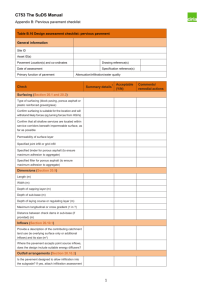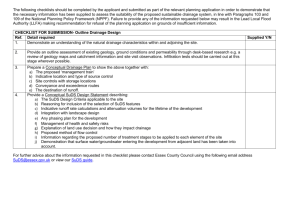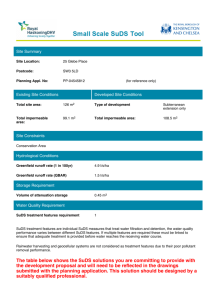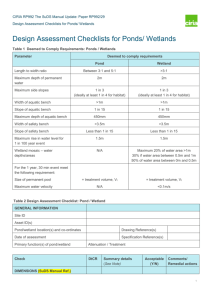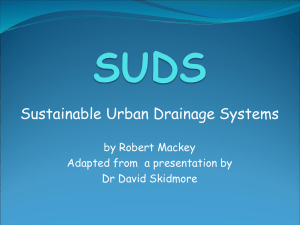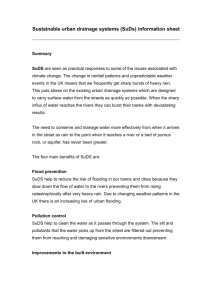Design Assessment Checklists for Permeable/Porous
advertisement
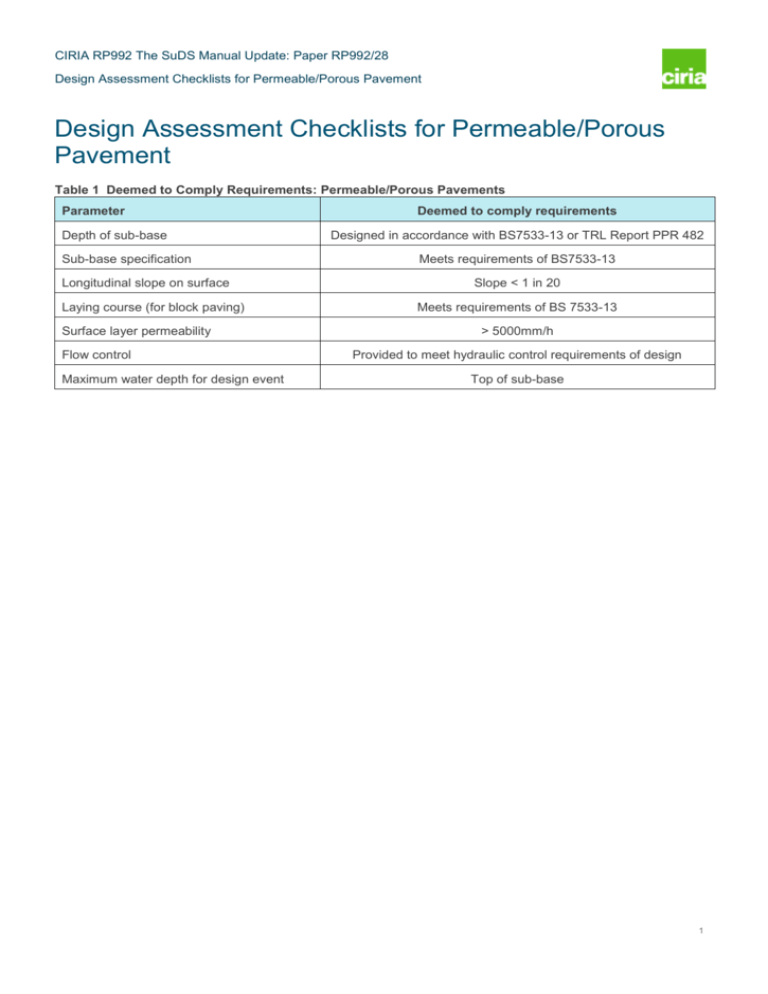
CIRIA RP992 The SuDS Manual Update: Paper RP992/28 Design Assessment Checklists for Permeable/Porous Pavement Design Assessment Checklists for Permeable/Porous Pavement Table 1 Deemed to Comply Requirements: Permeable/Porous Pavements Parameter Depth of sub-base Sub-base specification Longitudinal slope on surface Laying course (for block paving) Surface layer permeability Flow control Maximum water depth for design event Deemed to comply requirements Designed in accordance with BS7533-13 or TRL Report PPR 482 Meets requirements of BS7533-13 Slope < 1 in 20 Meets requirements of BS 7533-13 > 5000mm/h Provided to meet hydraulic control requirements of design Top of sub-base 1 CIRIA RP992 The SuDS Manual Update: Paper RP992/28 Design Assessment Checklists for Permeable/Porous Pavement Table 2 Design Assessment Checklist: Permeable/Porous Pavement GENERAL INFORMATION Site ID Asset ID(s) Pavement Location(s) and co-ordinates Drawing Reference(s) Date of assessment Specification Reference(s) Primary function of pavement Attenuation / Infiltration / Water Quality Check DtCR Summary details (See Note) Acceptable (Y/N) Comments/ Remedial actions SURFACING (SuDS Manual Ref.) Type of surfacing (block paving, porous asphalt or plastic reinforced gravel/grass) Confirm surfacing is suitable for the location and will withstand likely forces (e.g. turning forces from HGVs). Confirm all shallow services are located within service corridors beneath impermeable surface, as far as possible Permeability of surface layer Specified joint infill or grid infill Specified binder for porous asphalt (to ensure maximum adhesion to aggregate) Specified filler for porous asphalt (to ensure maximum adhesion to aggregate) DIMENSIONS (SuDS Manual Ref.) Length (m) Width (m) Depth of capping layer (m) Depth of sub-base (m) Depth of laying course or regulating layer (m) Maximum longitudinal or cross gradient (1 in ?) 2 CIRIA RP992 The SuDS Manual Update: Paper RP992/28 Design Assessment Checklists for Permeable/Porous Pavement Check DtCR Summary details (See Note) Acceptable (Y/N) Comments/ Remedial actions Distance between check dams in subbase (if provided) (m) INFLOWS (SuDS Manual Ref.) Provide a description of the contributing catchment land use (i.e. overlying surface only or additional inflows) and its size (m2). Where the pavement accepts point source inflows, does the design include suitable energy diffusers? OUTFALL ARRANGEMENTS (SuDS Manual Ref.) Is the pavement designed to allow infiltration into the subgrade? If yes, attach Infiltration Assessment. Provide details of any flow control systems, overflow arrangements and limiting discharge rate from pavement. Is a geomembrane required to prevent infiltration or protect foundations? If yes, give reason. Depth to maximum likely groundwater level (m) ATTENUATION (SuDS Manual Ref.) Confirm voids ratio of sub-base material. Demonstrate collection pipework is of sufficient capacity? Demonstrate that if the sub-base is used to convey water, the flow capacity will be sufficient? Provide calculations for maximum water depth and return period for the design event. Check dams required because of sloping subgrade? If yes, provide details. STRUCTURAL PAVEMENT DESIGN (SuDS Manual Ref.) 3 CIRIA RP992 The SuDS Manual Update: Paper RP992/28 Design Assessment Checklists for Permeable/Porous Pavement Check DtCR Summary details (See Note) Acceptable (Y/N) Comments/ Remedial actions CBR* used in design and confirm it is appropriate to the soils below the site when wetted. Assumed traffic loads used in design. Design method used for structural design and provide calculations LANDSCAPE (SuDS Manual Ref.) Is the proposed planting adjacent to the pavement appropriate to the location? Is pavement protected from silt wash off from adjacent planting areas? CRITICAL MATERIALS/ PRODUCT SPECIFICATIONS Geomembrane Geotextile (non-woven) Geogrids Blocks/asphalt/plastic grids Block jointing or grid infill material Laying course Base course (Note: where this is to be used as a temporary running course during construction, demonstrate that the puncture frequency is sufficient to support the design hydraulic performance of the system) Sub-base Capping layer Topsoil Other (including proprietary systems) CONSTRUCTABILITY (SuDS Manual Ref.) Are there any identifiable construction risks? If yes, state and confirm acceptable risk management measures are proposed. (Note key requirement to 4 CIRIA RP992 The SuDS Manual Update: Paper RP992/28 Design Assessment Checklists for Permeable/Porous Pavement Check DtCR Summary details (See Note) Acceptable (Y/N) Comments/ Remedial actions Acceptable (Y/N) Date changes made protect permeable surface during construction.) MAINTAINABILITY (SuDS Manual Ref.) Confirm that access for maintenance is acceptable and summarise details. Are there specific features that are likely to pose maintenance difficulties? If yes, identify mitigation measures required. PAVEMENT DESIGN ACCEPTABILITY (SuDS Manual Ref.) Summary details including any changes required Acceptable: Minor changes required: Major changes required / re-design: Note: Input range if applied to > 1 pavement. If there is a DtCR (as indicated) confirm whether or not this is met and provide details of any variations. *CBR = California Bearing Ratio. This is a penetration test for evaluation of the mechanical strength of subgrades and basecourses. 5
